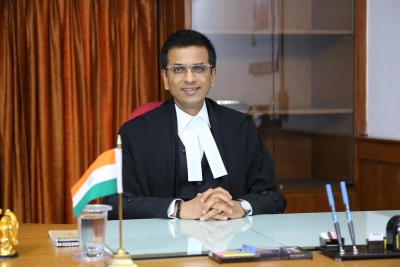Society's privileged members should confer respect on the marginalised: Justice Chandrachud
By IANS | Updated: December 6, 2021 23:05 IST2021-12-06T22:57:13+5:302021-12-06T23:05:15+5:30
New Delhi, Dec 6 Supreme Court judge, Justice D.Y. Chandrachud on Monday said the privileged members of the ...

Society's privileged members should confer respect on the marginalised: Justice Chandrachud
New Delhi, Dec 6 Supreme Court judge, Justice D.Y. Chandrachud on Monday said the privileged members of the society must break free from the shackles of the past to respect and recognise members of the marginalised communities.
Delivering the 13th B.R. Ambedkar Memorial Lecture, organised by Indian Institute of Dalit Studies and the Rosa Luxemburg Stiftung, South Asia, on 'Conceptualising marginalisation: agency, assertion, and personhood', he said: "Love and concern showered is a prerequisite for self-confidence, one's sense of possessing rights for self-respect, and viewing yourself as a 'special person' for self-esteem. These three forms of recognition would allow the members of the marginalised communities to claim holistic personhood from the continuous state of depletion."
He stressed that there must be a transformation towards securing a vision premised on inclusiveness.
"It is necessary that the privileged members of the society break free from the shackles of the past, and confer respect and recognition to the members of the marginalised communities," he said.
Justice Chandrachud said though providing protective rights to the members of the marginalised community is empowering since it furthers internalisation, it is in itself insufficient to confer personhood.
"It is important that we celebrate their identity, recognise their individual and group identities, and create conducive spaces for them to exercise their agency. The process of 'othering' and exclusion must be put to an end," he said.
He further added that the presence of multiple such rights in the Constitution has not always led to a positive change in the society's perception of marginalised groups and the individuals who belong to them.
Citing duality in the Indian constitution, Justice Chandrachud said Articles 15(1) and (2), and Articles 16(1) and (2) recognise that individuals may be identified as belonging to a certain group due to their religion, sex or caste, amongst others.
"Further, it acknowledges that this membership or perceived membership may be the basis on which they are discriminated against. Finally, it then holds such discrimination to be unconstitutional," he added.
He highlighted that a very specific and abhorrent form of such discrimination, untouchability, is specifically declared unconstitutional through Article 17. "However, at no point does the Constitution recommend that an individual should be considered as a silo or solely as themselves," he added.
He emphasised that the only way for the members of the marginalised communities to achieve personhood is through social mobilisation as a collective against discrimination. "Such mobilisation should not be considered as 'politics of identity' but as a necessary means for redressing historical discrimination," he added.
Justice Chandrachud also pointed out that the members of the marginalised communities can also be institutionally humiliated not merely by using the tool of law but also by establishments that further a conducive environment for discrimination and humiliation to be perpetuated.
"Even if a discriminatory law is held unconstitutional by the Courts, or is repealed by the parliament, the discriminatory behavioural pattern is not immediately overturned," he said.
He added the personhood conferred to members of the marginalised groups would be diminished unless we recognise and abolish, in spirit, the unequal power structures which facilitate humiliation.
"I cannot think of any such instance where an individual was granted personhood by the law and society. Personhood has always vested in groups or classes of people: the Blacks, the women, the Dalits, the Tribes, and the homosexuals... These groups were granted diminished personhood at some point in the history of mankind," he said, citing that personhood is thus never granted to or taken away from one individual.
Disclaimer: This post has been auto-published from an agency feed without any modifications to the text and has not been reviewed by an editor
Open in app